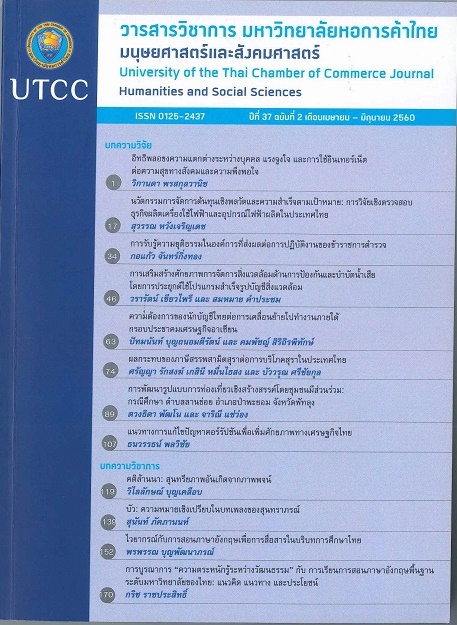การเสริมสร้างศักยภาพการจัดการสิ่งแวดล้อมด้านการป้องกันและบำบัดน้ำเสียโดยการประยุกต์ใช้โปรแกรมสำเร้จรูปบัญชีสิ่งแวดล้อม
Main Article Content
บทคัดย่อ
งานวิจัยนี้มีวัตถุประสงค์เพื่อศึกษาการจัดทำบัญชีสิ่งแวดล้อมด้านการป้องกันและบำบัดน้ำเสียขององค์การปกครองส่วนท้องถิ่น และพัฒนาฌปรแกรมสำเร็จนูปบัญชีสิ่งแวดล้อมด้านการจัดการป้องกันและบำบัดนำเสีย รวมทั้งการเสริมสร้างศักยภาพการป้องกันและบำบัดน้ำเสีย โดยใช้วิธีการวิจัยเชิงคุณภาพ สุ่มตัวอย่างด้วยวิธีการหลายขั้นตอนได้ตัวอย่างจำนวน 3 แห่ง จากองค์กรปกครองส่วนท้องถิ่นจังหวัดสมุทรปราการ จำนวน 50 แห่ง เครื่องมือการวิจัยคือ แบบประเมินประสิทธิภาพการใช้โปรแกรมสำเร็จรูป และแบบประเมินการฝึกอบรม อาศัยวิธีการวิเคคราะห์เนื้อหาโดยสถิติร้อยละในการวิเคราะห์ข้อมูล ผลการวิจัยพบว่า 1) องคืกรปกครองส่วนท้องถิ่นไม่มีการจัดทำบัญชีแวดล้อมด้านการป้องกันและบำบัดน้ำเสีย 2) การพัฒนาโปรแกรมสำเร็จรูปบัญชีสิ่งแวดล้อมด้านการป้องกันและบำบัดน้ำเสีย V.1.0 และ V.2.0 และผลการประเมินประสิทธิภาพของโปรแกรมสำเร็จรูปจากผู้เชี่ยวชาญและบุุคคลทั่วไปส่วนใหญ่อยู่ในระดับดีมากและระดับดี 3) การเสริมสร้างศักยภาพการป้องกันและบำบัดน้ำเสีย พบว่าผลการประเมินระดับความรู้ความเข้าใจของผู้เข้ารับการอบรมส่วนใหญ่อยู่ในระดับมากและมากที่สุด
Article Details
ลิขสิทธิ์ของบทความ
ผลงานที่ได้รับการตีพิมพ์ถือเป็นลิขสิทธิ์ของมหาวิทยาลัยหอการค้าไทย ห้ามมิให้นำเนื้อหา ทัศนะ หรือข้อคิดเห็นใด ๆ ของผลงานไปทำซ้ำ ดัดแปลง หรือเผยแพร่ ไม่ว่าทั้งหมดหรือบางส่วนโดยไม่ได้รับอนุญาตเป็นลายลักษณ์อักษรจากมหาวิทยาลัยหอการค้าไทยก่อน
เอกสารอ้างอิง
Chaisuwan, A. T. (2003). Environmental accounting: Case study of industrialbusiness in northern region industrial estate Lamphon province (Unpublished master’s independent study). Chiang Mai University. (in Thai).
Charoensuk.A.(2009).Accounting practice for environment in Navanakorn district (Unpublished master’s thesis). Rajamangala University of Technogy Thanyaburi, Pathumtani, Thailand. (in Thai).
Dilchert, S., & Ones, D.S. (2012). Measuring and improving environmental sustainability.
In S. E. Jackson, D. S. Ones, & S. Dilchert (Eds.), Managing human resources for environmental sustainability (pp.187-221).San Francisco: Jossey-Bass. Federation of Accounting Professions. (2013).Guideline of accounting audit practice: Code 1010. Bangkok, Thailand: Author. (in Thai).
Khewpairee, V., & Intarachai, C. (2011). Management of prevention and treatment of water pollution in industrial factories in Samut Prakan Province. Bangkok, Thailand: Dhonburi Rajabhat Univesity. (in Thai).
Kongsung, J. (2008). Application of the United Accounting Guideline on environment to corporations register in
the Stock Exchange (Unpublished master’s thesis). Siam University, Bangkok, Thailand (in Thai).
Office of Nationnal Economics and Social Development Board. (2012). Strategic of the eleventh National Economic and
Social Development Plan (2012-2016). Bangkok, Thailand: Author. (in Thai).
Pinpalai, J. (2012). The study on factors affected to Environmental Accounting. Bangkok, Thailand: Faculty of Accounting, Dhurakit Pundit University. (in Thai).
Schalteggar, S.,Hahn, T., & R.(2000).Environmental management accounting overview and main approaches. Retrieved Overview and main approaches.Retrieved June 17 , 2016 ,from www2.leuphana.delumanagement/csm/ content/___/ob_1dwnload version.pdf
Thailand Development Research Institute. Thailand Development Research Institute.(2007). Project of priority of environmental problem in Thailand. Bangkok, Thailand: Author. (in Thai).
United Nations.(2001). Environmental management accounting procedures and principles.New York: United Nations.
Wiriyapat, N. (2013). The movement of ISO 26000 to organizational culture for social responsibility. University of the Thai Chamber of Commerce Journal, 33(2), 200-213. (in Thai).


